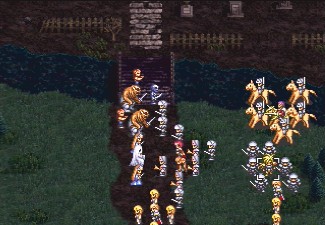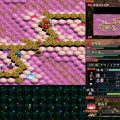Masaya decided to reinvent the wheel for Langrisser‘s first 32-bit outing. The result was met with disapproval by fans everywhere, although the changes aren’t necessarily terrible.
Instead of commanding each unit on the battlefield, you’re only given control over the generals. After setting a destination for your general, your characters and the enemies move simultaneously. When they collide, the screen zooms into the battlefield, where you can give specific commands to each squad member, or just let the computer take over. You’re then “treated” to a pseudo-3D rendition of the battle, but the graphics in these segments are godawful. The sprite based characters are too pixellated, and the battlefield contains almost no detail, just sparse, low-res textures. The camera can’t keep up either, darting over the battlefield almost randomly, and the framerate varies greatly depending on the action. The action is pretty frantic, and it’s fun to see your generals unleash their special attacks and send hordes of soldiers fly to their deaths. It seems like Masaya wanted to imitate the grand-scale mini-wars found in Sega’s Dragon Force games, but they just didn’t know how to do it right.
Like all Langrisser games, there are tons of characters on the battlefield, and these battle segments slow things down even more than previous installments. They can be turned off, which removes much the micromanagement strategy that you needn’t worry about most of the time anyway. But since the game is so streamlined, and so much of the game out of your control, it really feels like you’re removed from the battle. The basics are still mostly the same, except the class system has been overhauled. You never promote characters, but instead you can assign them different classes at the beginning of each battle. Naturally, the more levels they gain, the wider the possibilities.
Langrisser III is actually a prequel to the first two games, as it details the creation of the first Langrisser sword, and the origins of the Descendents of Light.
Characters
Dyhalto
Forefather to Redin and Elwin, Dyhalto has a golden mane that would put any Akira Toriyama character to shame.
Tialiss
Your typical girly mage character. Her father is killed early on, so she joins with Dyhalto.
Rifani
Rifani travels with her loser compatriot Pierre, and gets ambushed by enemy soldiers before Dyhalto helps them out.
Luna
Luna is a steadfast warrior – the only way to impress her is by fighting your battles efficiently.
Frea
Princess Frea actually fights against you, but you can still attract her if you play your cards right.
Langrisser III also introduces a love system similar to the Sakura Taisen games – depending on what you say and do to your female compatriots, their feelings will change about you. At the finale, you’ll end up together with the one you’ve impressed the most. While the multiple paths of Der Langrisser are gone, there are still two major endings depending on various choices you’ve made throughout the game.
The music is also a bit lacking, both in instrumentation and composition. There’s a wide variety of songs, at least. It’s just another one of those factors that, like the rest of the game, just isn’t quite up to par with the rest of the series. Once you get used to the overhauled system, it’s still plenty of fun – it seems like an unnecessary attempt to simplify things, and the end result is a bit awkward. Langrisser III is the only game of the series to be denied multiple ports – other than an odd PC release in Korea, it only came out on the Saturn. A limited edition comes with a hologram cover and a small fanbook featuring interviews with the voice actors, but nothing terribly exciting. It was also re-released for the Playstation 2, although barely upgraded. Oddly enough, some of more scantily clad female characters were given more clothing.


